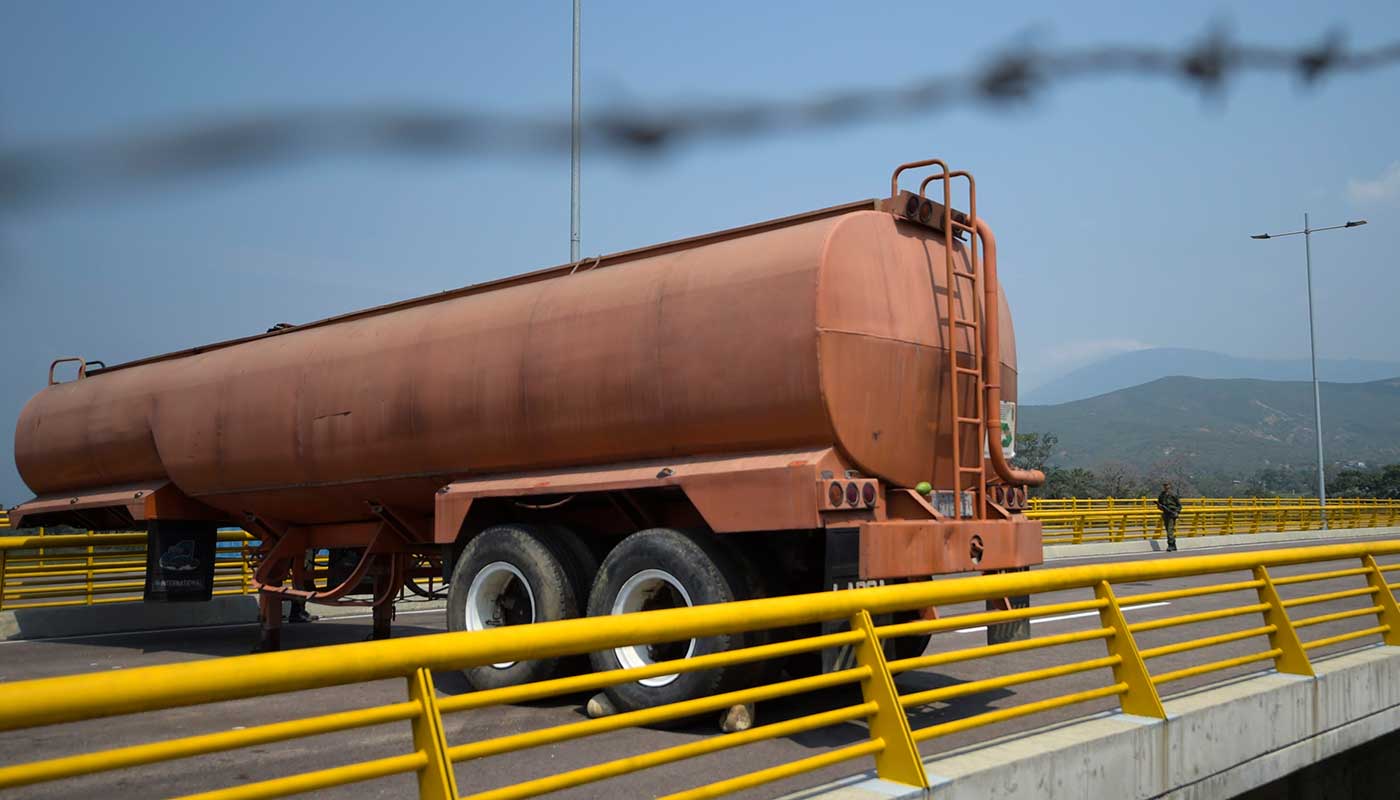Venezuela blockades bridge to stop aid
Embattled president Nicolas Maduro has rejected foreign aid amid economic crisis

A free daily email with the biggest news stories of the day – and the best features from TheWeek.com
You are now subscribed
Your newsletter sign-up was successful
Venezuelan troops have blockaded a bridge that connects the country to Colombia, in an apparent bid by President Nicolas Maduro to stop international humanitarian aid being delivered.
Two shipping containers and an oil tanker have been positioned on the Tienditas international bridge, near the Colombian city of Cucuta, which was one of three designated staging points for the delivery of aid.
The convoy, donated by the United States, left Bogota on Wednesday morning, and was due to cross the bridge later today.
The Week
Escape your echo chamber. Get the facts behind the news, plus analysis from multiple perspectives.

Sign up for The Week's Free Newsletters
From our morning news briefing to a weekly Good News Newsletter, get the best of The Week delivered directly to your inbox.
From our morning news briefing to a weekly Good News Newsletter, get the best of The Week delivered directly to your inbox.
The aid was organised by opposition leader and self-proclaimed interim president Juan Guaido, who called on the international community for help as Venezuela continues to sink into further economic collapse.
However, Maduro has “repeatedly denied his economically devastated country is facing a humanitarian crisis, apparently fearing such an acceptance could be used to justify foreign military intervention”, The Guardian says.
In a speech to his troops this week, Maduro insisted that Venezuela did not need any international help, saying: “We are not beggars.”
Reuters reports that the United Nations has issued a warning against “using aid as a pawn in Venezuela”. UN spokesman Stephane Dujarric told reporters in New York: “Humanitarian action needs to be independent of political, military or other objectives.”
A free daily email with the biggest news stories of the day – and the best features from TheWeek.com
The blockade comes just days after Maduro appeared to threaten Guaido with imprisonment.
John Bolton, Donald Trump’s national security adviser, has previously said that violence or intimidation of Guaido or other opposition leaders “would represent a grave assault on the rule of law and will be met with a significant response”.
-
 How the FCC’s ‘equal time’ rule works
How the FCC’s ‘equal time’ rule worksIn the Spotlight The law is at the heart of the Colbert-CBS conflict
-
 What is the endgame in the DHS shutdown?
What is the endgame in the DHS shutdown?Today’s Big Question Democrats want to rein in ICE’s immigration crackdown
-
 ‘Poor time management isn’t just an inconvenience’
‘Poor time management isn’t just an inconvenience’Instant Opinion Opinion, comment and editorials of the day
-
 Will increasing tensions with Iran boil over into war?
Will increasing tensions with Iran boil over into war?Today’s Big Question President Donald Trump has recently been threatening the country
-
 Corruption: The spy sheikh and the president
Corruption: The spy sheikh and the presidentFeature Trump is at the center of another scandal
-
 Rubio boosts Orbán ahead of Hungary election
Rubio boosts Orbán ahead of Hungary electionSpeed Read Far-right nationalist Prime Minister Viktor Orbán is facing a tough re-election fight after many years in power
-
 Greenland’s capital becomes ground zero for the country’s diplomatic straits
Greenland’s capital becomes ground zero for the country’s diplomatic straitsIN THE SPOTLIGHT A flurry of new consular activity in Nuuk shows how important Greenland has become to Europeans’ anxiety about American imperialism
-
 Epstein files topple law CEO, roil UK government
Epstein files topple law CEO, roil UK governmentSpeed Read Peter Mandelson, Britain’s former ambassador to the US, is caught up in the scandal
-
 Iran and US prepare to meet after skirmishes
Iran and US prepare to meet after skirmishesSpeed Read The incident comes amid heightened tensions in the Middle East
-
 Which way will Trump go on Iran?
Which way will Trump go on Iran?Today’s Big Question Diplomatic talks set to be held in Turkey on Friday, but failure to reach an agreement could have ‘terrible’ global ramifications
-
 Israel retrieves final hostage’s body from Gaza
Israel retrieves final hostage’s body from GazaSpeed Read The 24-year-old police officer was killed during the initial Hamas attack